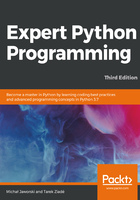
Stackless Python
Stackless Python advertises itself as an enhanced version of Python. Stackless is named so because it avoids depending on the C call stack for its own stack. It is, in fact, a modified CPython code that also adds some new features that were missing from the core Python implementation at the time Stackless was created. The most important of these are microthreads, which are managed by the interpreter as cheap and lightweight alternatives to ordinary threads, that must depend on system kernel context switching and task scheduling.
The latest available versions are 2.7.15 and 3.6.6 and implement 2.7 and 3.6 versions of Python, respectively. All the additional features provided by Stackless are exposed as a framework within this distribution through the built-in stackless module.
Stackless isn't the most popular alternative implementation of Python, but it is worth knowing, because some of the ideas that were introduced in it had a strong impact on the language community. The core switching functionality was extracted from Stackless and published as an independent package named greenlet, which is now the basis for many useful libraries and frameworks. Also, most of its features were re-implemented in PyPy—another Python implementation that will be featured later. The official online documentation of Stackless Python can be found at https://stackless.readthedocs.io and the project wiki can be found at https://github.com/stackless-dev/stackless.